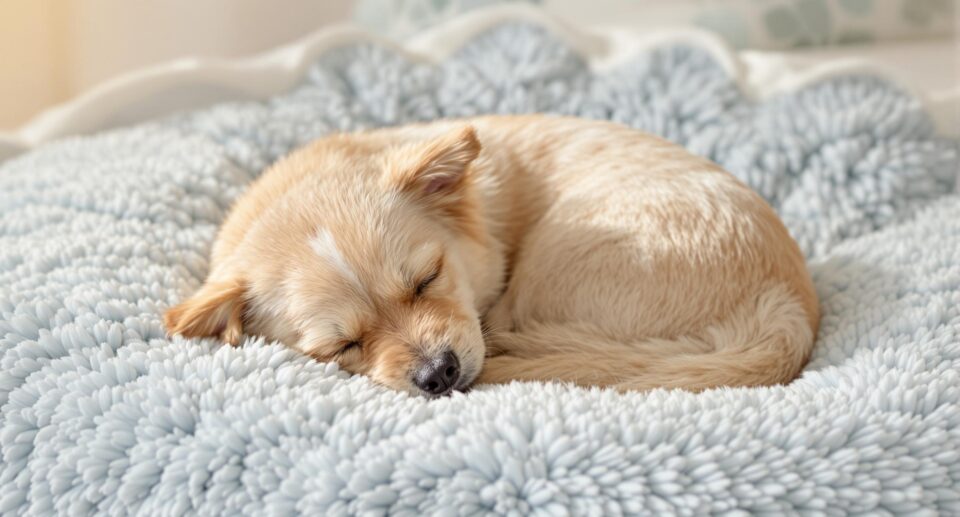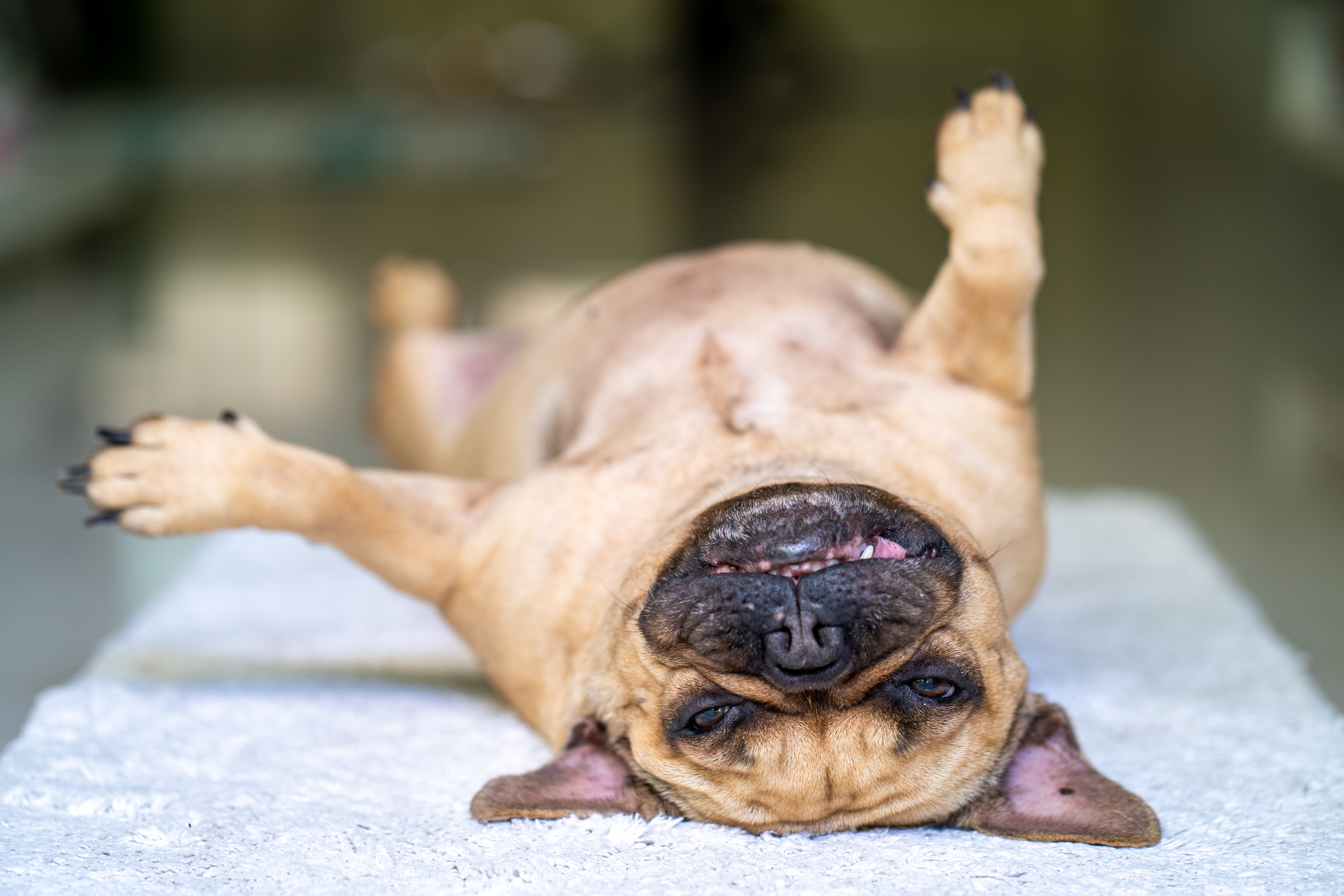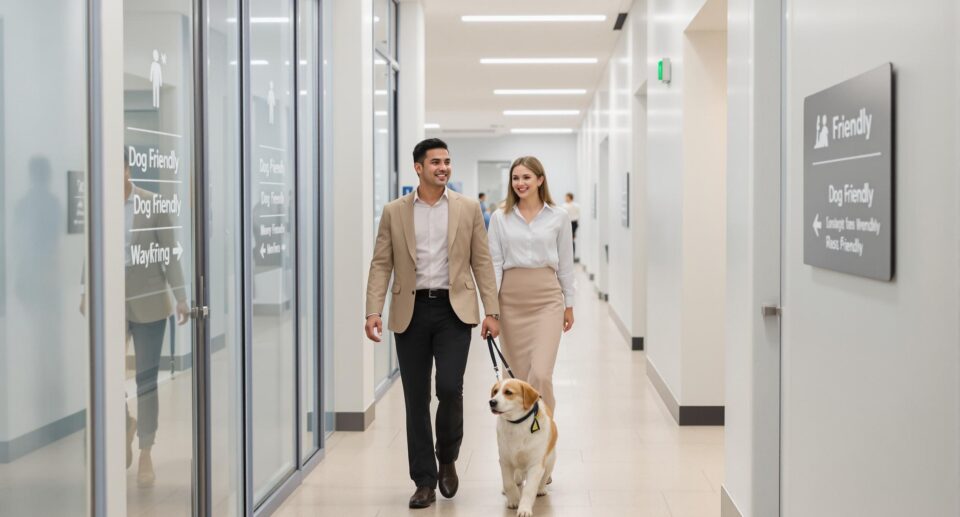Does Your Dog Stop Breathing In Their Sleep? What To Know About Sleep Apnea in Dogs

Does your pet ever wake up gasping for air? They might have sleep apnea, a disorder that causes episodes during which your pet stops breathing in their sleep.
While these episodes can be distressing to both you and your pet, they’re likely to fall back asleep once they catch their breath. Learn how underlying respiratory issues are connected to sleep apnea in pets and what you can do to help your dog or cat breathe easy at night.
What Is Sleep Apnea?
There are two types of sleep apnea: obstructive sleep apnea (OSA), caused by an obstructed airway, and central sleep apnea (CSA), which is attributed to disconnect between the brain and the muscles that control breathing. The type that affects pets is usually OSA.
What Causes Sleep Apnea in Pets?
Pets with sleep apnea usually also have breathing issues that may cause symptoms during the day. During sleep, the throat muscles relax, potentially exacerbating existing respiratory issues like tracheal collapse or brachycephalic airway syndrome.
In pets with tracheal collapse, the cartilage that holds the throat open can weaken and collapse into the airway, leading to coughing and hacking, especially after exercise, overexcitement, or barking. Small dogs are more likely than other pets to develop a collapsed trachea. Some, but not all pets with tracheal collapse will also experience sleep apnea.
Brachycephalic Obstructive Airway Syndrome (BOAS) is also associated with sleep apnea in pets. Dogs and cats with BOAS are short-nosed breeds like Pugs, Bulldogs, French Bulldogs, and Persian cats.
The short palate, a piece of tissue located at the back of the throat, divides the oral and nasal cavities. In pets with BOAS, a short nose can mean a disproportionately long short palate, which can obstruct the airway. Dogs and cats with BOAS may experience gasping, snorting, and reverse sneezing during the day, and may also develop sleep apnea.
What Are The Risk Factors for Sleep Apnea in Pets?

Caption: Discourage your pet from sleeping on their back, which can worsen snoring and sleep apnea.
The structure of your pet’s airway, whether they have an elongated soft palate, a collapsed trachea, or both, is usually the primary cause of sleep apnea.
Sleep apnea tends to worsen with age, with most pets diagnosed in their senior years. With age comes the loss of muscle tone and tissue elasticity that can affect the airways. Senior pets are also more likely to be obese. Obesity increases your pet’s risk of sleep apnea, as fatty tissue surrounding the throat can put pressure on the trachea.
What Are The Symptoms of Sleep Apnea in Dogs and Cats?
Dogs and cats with sleep apnea experience brief, repeated episodes during which they stop breathing in their sleep. They may stir or completely awaken, sometimes audibly gasping or coughing.
Episodes of sleep apnea are usually preceded by snoring. However, not all animals that snore have sleep apnea.
Dogs and cats have shorter sleep cycles than humans, so it’s not unusual if your pet wakes up throughout the night. But if they often snore before suddenly awakening with a bout of coughing or gasping, they’re likely to have sleep apnea.
Is Sleep Apnea Fatal In Pets?
Most episodes of sleep apnea are not fatal. Though this condition can be serious, so long as your pet wakes up and resumes breathing, they are unlikely to be in immediate danger.
However, it’s unknown how often sleep apnea causes death in pets. In humans, those with sleep apnea have an increased risk of sudden death during sleep, as well as secondary complications like headaches, drowsiness, and cardiovascular issues. In pets, sleep apnea can also lead to seizures caused by a lack of oxygen to the brain.
How is Sleep Apnea Diagnosed and Treated in Pets?
Sleep apnea in pets is typically diagnosed with the pet parent’s report of symptoms.
Your veterinarian may physically examine your pet’s throat, chest, and airways, assess their heart rate, and can also use x-rays or fluoroscopy (moving x-rays) to determine the severity of your pet’s respiratory issues. Underlying respiratory issues like collapsed trachea or BOAS may be treated with surgery or medication.
If your pet is obese, your veterinarian will likely recommend that they lose weight. Exercise can help reduce body fat and increase muscle tone along the airways, but should be approved by your vet, as existing respiratory issues can make strenuous exercise unsafe for your pet. Switching to a weight management diet may also help you see improvements in your pet’s symptoms.
In humans, sleep apnea is treated with the use of a continuous positive airway pressure (CPAP) machine that delivers pressurized air through a mask. While there have been experimental cases in which dogs and cats have been fitted with helmet-style CPAP devices, it’s uncommon for this type of therapy to be recommended for pets.





